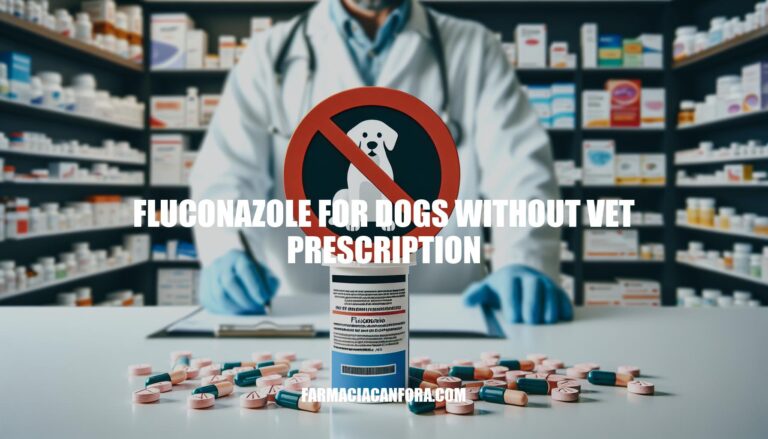Fluconazole is an antifungal medication often used to treat various fungal infections in dogs. While it can be effective, using fluconazole without a vet’s prescription poses significant risks. These include incorrect dosing, potential side effects like liver toxicity, and the possibility of not addressing the underlying health issue properly. Always consult a veterinarian before administering any medication to your pet.
What is Fluconazole?
Fluconazole is an antifungal medication used to treat fungal and yeast infections in various animals, including dogs, cats, horses, birds, and small mammals. It’s commonly used for conditions like cryptococcal meningitis, blastomycosis, histoplasmosis, and skin infections such as ringworm.
Some pet owners might seek fluconazole without a vet prescription due to its effectiveness and the desire to avoid vet consultation costs. However, using it without professional guidance can be risky due to potential side effects and the need for proper dosage.
Risks of Using Fluconazole Without Vet Prescription
Administering fluconazole to dogs without professional veterinary guidance can be risky. Here are some potential dangers and side effects:
- Incorrect Dosage: Without a vet’s guidance, you might give an incorrect dosage, which can lead to either ineffective treatment or overdose.
- Liver Toxicity: Fluconazole can cause liver toxicity, especially with long-term use. Monitoring liver function is crucial.
- Gastrointestinal Issues: Common side effects include vomiting, diarrhea, and loss of appetite.
- Drug Interactions: Fluconazole can interact with other medications, potentially causing harmful effects.
- Allergic Reactions: Some dogs may be allergic to fluconazole, leading to severe reactions.
- Delayed Treatment: Incorrect use can delay proper treatment, worsening the dog’s condition.
Always consult a veterinarian before administering any medication to ensure safe and effective treatment for your pet.
Legal and Ethical Considerations
Legal Issues:
- Prescription Requirement: Fluconazole is not FDA-approved for veterinary use but can be prescribed off-label by veterinarians. Using it without a prescription is illegal.
- Regulatory Compliance: Administering prescription medications without veterinary oversight violates veterinary practice laws and regulations.
Ethical Issues:
- Animal Welfare: Administering fluconazole without veterinary guidance can lead to incorrect dosing, potential side effects, and ineffective treatment.
- Professional Integrity: Bypassing veterinary advice undermines the professional role of veterinarians and can compromise the standard of care.
Potential Consequences:
- Health Risks: Incorrect use can cause adverse reactions such as liver toxicity, gastrointestinal issues, and other side effects.
- Legal Repercussions: Owners may face legal penalties for administering prescription medications without proper authorization.
Alternatives to Fluconazole Without Vet Prescription
Safer Alternatives:
- Natural Remedies: Options like quercetin, fish oil, and CBD oil can help reduce inflammation and itching.
- Prescription Alternatives: Cytopoint and Atopica are effective for managing severe itching without the long-term immune suppression risks.
- Non-Toxic Treatments: Oral medications with ingredients like lufenuron, nitenpyram, or spinosad are safer than topical treatments.
Importance of Consulting a Veterinarian:
- Accurate Diagnosis: Vets can identify the root cause of your pet’s symptoms.
- Safe Dosage: Ensures the correct dosage and reduces the risk of side effects.
- Monitoring: Regular check-ups help monitor your pet’s response to the medication and adjust treatment as needed.
Always consult your veterinarian before starting any new treatment for your pet to ensure their safety and well-being.
Fluconazole: Risks of Self-Medication in Dogs
Fluconazole, an antifungal medication, can be effective in treating fungal infections in dogs but using it without a vet’s prescription poses significant risks. These include incorrect dosing, potential side effects like liver toxicity, and the possibility of not addressing the underlying health issue properly.
Administering fluconazole to dogs without professional veterinary guidance can lead to serious consequences such as adverse reactions, legal repercussions, and compromised animal welfare.
It is essential to consult a veterinarian before administering any medication to ensure safe and effective treatment for your pet. A vet can provide accurate diagnosis, safe dosage, and monitoring, reducing the risk of side effects and ensuring the best possible outcome for your dog’s health and safety.


